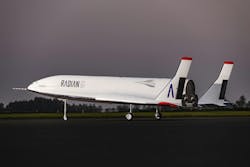Radian Aerospace completes first ground tests for its reusable spaceplane prototype
ABU DHABI, UAE - Radian Aerospace in Seattle announced the completion of the first round of ground taxi tests with its prototype flight vehicle, PFV01, marking a key milestone in the development of its Radian One spaceplane. The company, which is developing fully reusable spaceplanes with horizontal takeoff and landing capabilities, conducted the tests in Abu Dhabi.
The tests were designed to evaluate the vehicle’s low-speed takeoff and landing characteristics, focusing on handling and yaw stability. PFV01, a prototype that shares the aerodynamic profile of Radian’s AV09 design, completed several pitch-up maneuvers and short hops, gathering crucial data through integrated telemetry systems.
"These successful tests represent an early but significant step in our broader journey to bring Radian One to market," said Richard Humphrey, co-founder and CEO of Radian. "While we know there is much work ahead, each step in our robust test program brings us closer to transforming access to space with rapid, reusable, and cost-effective transport to low Earth orbit."
During the tests, Radian’s engineering team worked on tuning the flight control systems and comparing real-world data with their analytical predictions. Telemetry systems were used to track important stability and control metrics.
"We've made substantial technical progress with PFV01," said Livingston Holder, co-founder and CTO of Radian. "Validating our aerodynamic analysis allows us to better define our shape by systematically de-risking critical elements of our spaceplane’s design."
The prototype, constructed from composite materials, serves as a test platform for higher-risk design elements that will inform the development of Radian One. Future tests are planned for the coming months at a longer runway, where PFV01 will undergo higher-speed tests, expanding the flight envelope and providing further data for the spaceplane’s design process.
